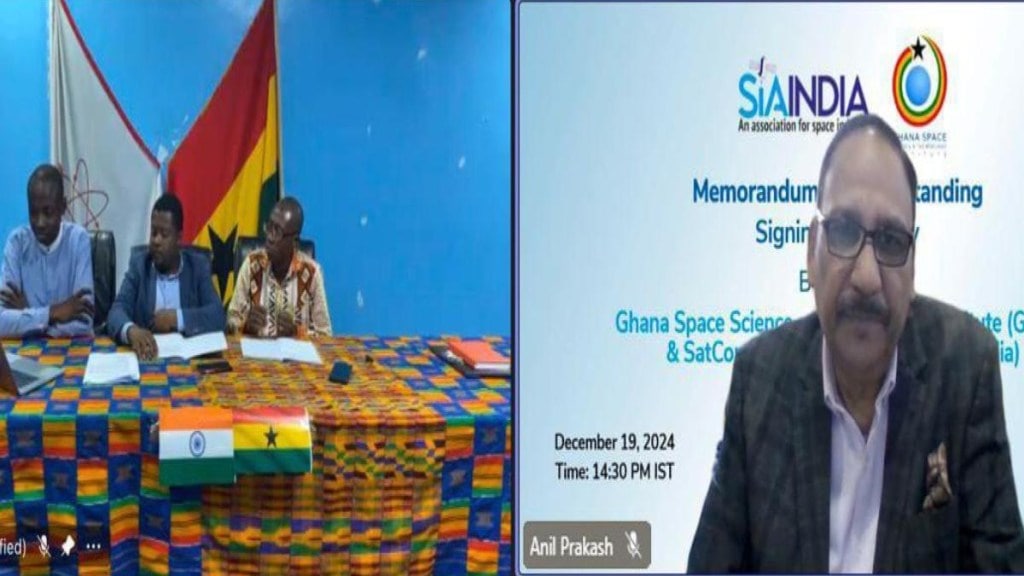Africa is increasingly turning to space technology as a vital tool for socio-economic development, and Ghana is leading the charge in this regard. In a significant move to advance its space ambitions, Ghana has signed a Memorandum of Understanding (MoU) with SIA-India, an association dedicated to fostering growth in the Indian space sector. This partnership, focusing on satellite communications and space technologies, marks a new chapter in the growing cooperation between India and Africa in the space domain.
A Strategic Partnership for Technological Growth
The MoU between the Ghana Space Science and Technology Institute (GSSTI) and SIA-India underscores a shared vision to promote the growth and sustainability of space-based technologies that will benefit both nations. Ghana, a key player in Africa’s space strategy, is looking to leverage India’s cutting-edge space capabilities, including satellite manufacturing, launch services, and innovative space applications.
India has long been a trusted partner for African nations in space and technology initiatives, demonstrated through various successful collaborations such as the Pan Africa eNetwork Project and the India-Africa Partnership Fund. As India continues to make strides in space exploration and technology, its partnership with Ghana aligns with Africa’s broader vision for the future outlined in Agenda 2063 and the Science, Technology, and Innovation Strategy for Africa (STISA-2024). These frameworks emphasize space as a key driver of socio-economic transformation across the continent.
Space Cooperation for Economic Development
The Ghana-India space cooperation focuses on several key areas, including satellite co-development, capacity-building programs for Ghanaian space professionals, and the establishment of ground stations and space applications tools. The partnership aims to create tangible socio-economic benefits through pilot projects in agriculture, mining, and environmental management, showcasing how space technologies can solve real-world problems.
Dr Subba Rao Pavuluri, President of SIA-India, highlighted the significance of this collaboration, stating, “Through this partnership, we aim to formalize cooperation that will drive impactful initiatives, including capacity-building programs tailored for Ghanaian space professionals, and the co-development of satellites, ground stations, and space application tools.” These initiatives are expected to have a far-reaching impact on both nations, fostering innovation and advancing technological expertise.
This cooperation also serves to strengthen Ghana’s role as a leader in space science and technology in Africa. By integrating satellite-based solutions into critical sectors like agriculture and environmental monitoring, Ghana can harness the potential of space technologies to address pressing challenges, from food security to climate change.
Unlocking New Business and Development Opportunities
The MoU also paves the way for increased business-to-business (B2B) and business-to-government (B2G) collaboration between India and Ghana, facilitating new opportunities for both countries’ private sectors. Companies in both nations are encouraged to explore joint ventures, business collaborations, and knowledge exchange, creating a mutually beneficial ecosystem that will fuel growth and innovation in the space sector.
India’s role as a global leader in space technology is steadily growing, and partnerships like the one with Ghana solidify its position as a key player in driving space-based solutions to address global challenges.
Anil Prakash, Director General of SIA-India, emphasized the importance of these international ties, saying, “The MoU with GSSTI highlights India’s growing role as a key partner for transformative technologies in space, and we are committed to supporting Ghana in leveraging these technologies for socio-economic growth.”
Ghana’s Vision for Space and Technology
Established in 2012, the Ghana Space Science and Technology Institute (GSSTI) is tasked with coordinating the country’s space science and technology initiatives. Operating under the Ghana Atomic Energy Commission, GSSTI has established three major research centers focused on radio astronomy, remote sensing, and satellite communications. Through its strategic partnership with India, GSSTI aims to build upon its existing capabilities and expand its role in space science and technology on the global stage.
This partnership is particularly significant for Ghana, which is looking to deepen its engagement with space technologies to address socio-economic challenges. As Ghana progresses in its space journey, the collaboration with India offers valuable opportunities to enhance the country’s technological expertise and contribute to the broader African space agenda.
A Shared Future of Space Innovation
As Africa embraces the potential of space technology for socio-economic development, Ghana’s partnership with India represents a powerful step toward realizing this vision. The collaboration not only strengthens the bilateral ties between India and Ghana but also contributes to Africa’s broader efforts to harness space for sustainable development. With the continued growth of space technologies and applications, Ghana and India’s cooperative efforts are poised to unlock new opportunities for innovation, capacity building, and socio-economic transformation, creating a brighter, more connected future for both nations.

